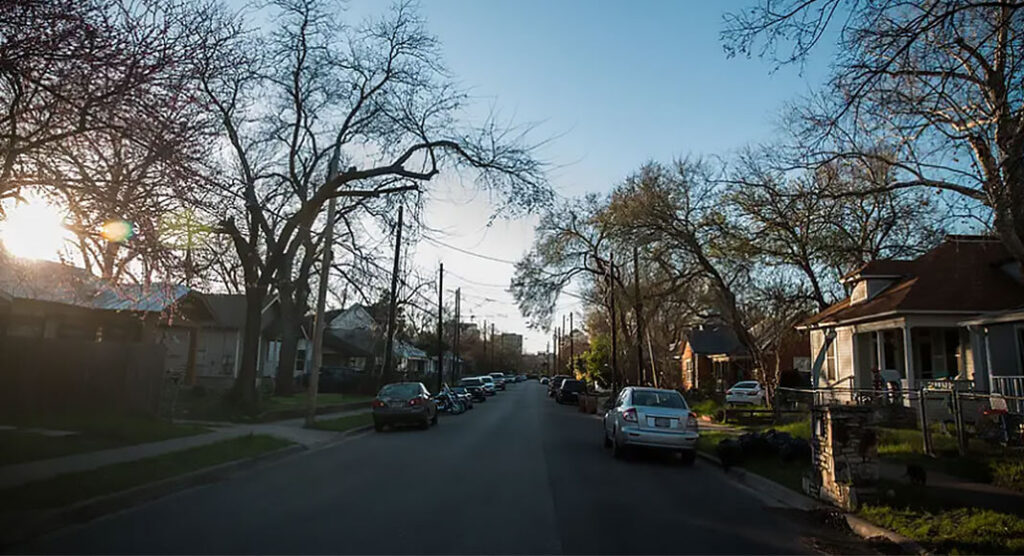
The Texas Tribune
BY JOSHUA FECHTER / The Texas Tribune
With the renewed backing of Gov. Greg Abbott, legislation to cut property tax rates is on a fast track through the Texas Legislature.
Republican lawmakers including Abbott have faced pressure from the party’s right flank to target the state’s high property taxes. Backers have pointed to the $19 billion in federal stimulus money that has been set aside for Texas public schools and a nearly $8 billion surplus sitting in state coffers as an opportunity for the state to provide some temporary property tax relief.
“The obvious is that when you have excess funds, you should be giving some of it back to the taxpayers,” said state Sen. Paul Bettencourt, a Houston Republican and author of the property tax legislation.
Lawmakers are quickly pushing through a $2 billion tax-cut bill that’s aimed at shaving about $200 off of an average Texas homeowner’s tax tab. The measure sailed through the state Senate by a 30-1 vote Wednesday afternoon, hours after Abbott added property tax relief to his list of items for state legislators to tackle during this year’s third special session.
Bettencourt’s bill now heads to the House, where Speaker Dade Phelan has signaled an eagerness to tackle the matter.
Property tax reform has long been a pet issue for Texas Republicans. But even as Abbott included the relief in previous special session agendas, it flew under the radar as conservative social issues, the pandemic, the Texas power grid and the GOP voting bill grabbed the spotlight.
A version of Bettencourt’s bill made it to the House during the previous legislative session — but lawmakers ran out of time to take it up.
Abbott’s revived interest in property tax relief comes as he faces a March primary that’s testing his goodwill with the party’s right wing. Don Huffines, a former state senator challenging Abbott, needled the governor for initially leaving property tax cuts off the third special session agenda.
Before Abbott’s move, Lt. Gov. Dan Patrick appeared primed to push forward on property tax relief with or without Abbott’s blessing. In a session primarily called so lawmakers could fulfill a once-a-decade requirement to redraw the state’s political maps using the latest census data, Patrick deemed legislation cutting property taxes his top priority.
“This represents a quantum shift in the way we think about spending surplus dollars,” Patrick said last week. “Tax relief must come first — before new spending.”
When Abbott joined Patrick in prioritizing property tax cuts this week, he said it was “crucial to improving the quality of life for all Texans.”
Tax relief for property owners joins a crowded to-do list for Texas lawmakers this session — which includes redistricting, considering whether COVID-19 vaccines can be mandated and figuring out how to spend $16 billion in federal stimulus dollars to help the state bounce back from the COVID-19 pandemic.
Also on the list: restrictions on what sports teams transgender student athletes can join, another Patrick priority. Patrick had called on Abbott to make lawmakers take up the matter in a special session after it failed in the regular session.
“Patrick is acting like Abbott’s political id, the reflexive political part of the governor’s brain driven by base instincts of political survival,” said Brandon Rottinghaus, a political science professor at the University of Houston. “When Abbott is worried about the base, he listens to Patrick.”
But unlike some of the red-meat issues held dear by social conservatives, cutting property taxes holds broad appeal, political analysts said.
“I think they are responding to significant and intense concerns that average taxpayers have,” said Matt Mackowiak, Travis County Republican Party chair. “And I think it would be hard to go through a regular session and three special sessions and not have property taxes meaningfully addressed.”
The main vehicle for property tax relief this session is Senate Bill 1 — authored by Bettencourt, Patrick’s chief lieutenant on property taxes.
Under the bill, the state would use $2 billion in state funds to replace public education funding that would otherwise be collected by a school property tax, the bulk of a homeowner’s tax bill. School districts would have to lower their tax rates during the 2022-23 school year.
For a homeowner whose property is worth $300,000, the median value of a Texas home, that translates to $200 in temporary tax relief next year, according to Bettencourt’s office — though school district property tax rates can vary.
“It’s a fantastic bill for property taxpayers of all types, whether they’re where people work, where they sleep … it will help everyone out,” Bettencourt said on the Senate floor Wednesday.
If the Texas economy grows enough by June, the total state revenue used to offset property taxes could grow to $4 billion. In that instance, the median homeowner would see at least $300 in tax savings.
But even some Senate Republicans who voted for the bill have raised concerns. Consumers regaining confidence in the economy has bolstered the state’s revenue and helped put an extra $8 billion in the piggy bank, state Sen. Charles Perry, R-Lubbock said during a Senate Finance Committee hearing Tuesday — but who knows how long that will last?
“I have some real concerns that we’re spending money we don’t have,” Perry said.
Others worried the tax relief wasn’t enough. Texas property owners pay some of the highest tax rates in the nation — a byproduct of public schools’ reliance on property taxes for funding and a lack of a state income tax.
To give tax relief to homeowners one year only to have taxes go up again the next is a tough sell, said state Sen. Robert Nichols, R-Jacksonville.
“I think we’re all supportive of reducing taxes … but for me to go back and just tell people, ‘well this is just temporary, probably, maybe we don’t really know, we’ll have to wait and see,’ I don’t like to give talks like that,” Nichols said. “I would much rather have a permanent solution.”
Texas lawmakers have chipped away at school property tax rates in the past two years. House Bill 3, the landmark $11.6 billion school finance bill, included $5.1 billion in tax cuts on top of $6.5 billion in new spending. The bill put caps on school districts’ tax rates — caps that would become more stringent under SB 1.
“We don’t have any plan to replace those property tax revenues,” said Chandra Kring Villanueva, a program director at the left-leaning Every Texan, formerly the Center for Public Policy Priorities. “So each year, the state has to take on a greater and greater percentage of school funding. But none of those dollars benefit the classroom.”
Bettencourt dismissed those concerns.
“Certainly, by any measurement, that type of dramatic increase in funding into the public school system doesn’t leave me with any understanding of how people are underfunded at this point,” Bettencourt said.












